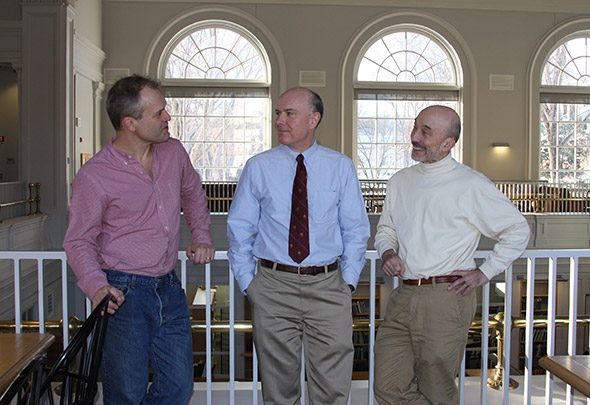When professors Doug Irwin, Meir Kohn, and Russell Muirhead get together to explain their new Political Economy Project, the interview quickly becomes a free-form conversation that explores the medieval marketplace, the economies of cities, and political responses to the recent financial crisis.

This passion for tackling broad questions about economic and political systems across the disciplines of economics, history, philosophy, religion, and government was the spark for the three to organize the project and line up independent funding. With support from interested alumni and others, the project will help fund course offerings across disciplines, support visiting professors, underwrite debates and lectures featuring prominent speakers, and recruit a post-doctoral fellow, says Irwin, the John Sloan Dickey Third Century Professor in the Social Sciences in the Department of Economics.
Political Economy Project Course offerings for 2014-15:“Is capitalism a system of injustice and exploitation, or a system that allows for individual freedom and prosperity? What does it mean to have a fair and just society, the equality of legal rights, or equality in the distribution of resources? The Political Economy Project aims to explore questions such as these,” Irwin says.Government 20: “The Foundations of Political Economy”
One goal of the course is to familiarize students with foundational thinkers who gave us the discipline of economics: Hobbes, Locke, Rousseau, Smith, Ricardo, Marx, Mill, and Spencer. The final goal is to consider how foundational ideas have shaped political economic debates in America for the past hundred years: Keynes, Hayek, and Schumpeter. Summer 2014, Professor Bernard Avishai
Economics 79: “The Clash of Economic Ideas”
Do the ideas of economists change the world, or do major events change the ideas of economists? This course interweaves economic history with the history of economic thought to explore some of the major economic events that have changed the world over the past two centuries, such as the industrial revolution, the Great Depression, the collapse of socialism, and the globalization of the world economy. Fall 2014, Professor Douglas Irwin
Economics 74: “The Political Economy of Development”
Why are some nations rich and others poor? Answering this question requires an understanding of the process of economic development and growth and also of the obstacles—predominantly political—that are placed in the way. This course develops such an understanding using the evidence of pre-industrial Europe and China and building on the insights of Adam Smith. It then applies this understanding to analyze the problems of developing and developed countries today. Winter 2015, Professor Meir Kohn
Muirhead, the Robert Clements Associate Professor of Democracy and Politics in the Department of Government, points to the Occupy movement. ”It raises a lot of urgent questions about the ethics of our political economy,“ he says. ”Our students want to assess these questions. The idea is to open an academic framework that equips them to address those questions in a disciplined and rigorous way.“
In fact, Irwin and Kohn each have a longstanding tradition of organizing not-for-credit book discussions and dinners on these topics, and unveiled the plan to students at a dinner/seminar this week. Now they will offer classes for credit and the project will enable students, faculty, and visiting speakers and scholars from all disciplines to explore these questions as well.
”Our goal is to inject some energy into the intellectual life at the College as it maps onto the subject of political economy,“ Muirhead says.
Political Economy Project Faculty-Student Dinners
The Monday dinners are from 6 p.m. to 7 p.m. at The Nelson A. Rockefeller Center for Public Policy and the Social Sciences.
- January 13: “Neo Populism Versus Neo Liberalism, Venezuela and Chile” With Doug Irwin, the John Sloan Dickey Third Professor in the Social Sciences
- January 20: “Morality and Economics” With Meir Kohn, professor of economics
- January 27: “What’s Wrong With Stealing?” With Kenneth Walden, assistant professor of philosophy
- February 3: “Opening Closed Political Minds: Is it Possible?” With Brendan Nyhan, assistant professor of government
- February 10: “In Search of Freedom: From Soviet Russia to the United States at Age 21” With Sergei Kan, professor of anthropology and Native American Studies
